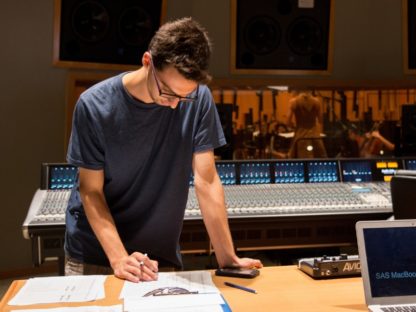The 2nd Annual Children & Family Creative Arts Emmy Awards for 2023 were announced on December 16 and broadcast over two days. One of the biggest winners was Netflix’s live-action CG fantasy miniseries, Lost Ollie, which took home five Emmys, including Outstanding Music Direction and Composition for a Live Action Program. The award honored alumnus Stephen Spies along with two of his colleagues, lead composer Scot Stafford and music supervisor Justine von Winterfeldt.
Lost Ollie uses a creative mix of live action and animation to tell the story of a patchwork rabbit toy that wakes up one day in a toyshop and can’t remember how it got there or why. But Ollie has big memories of Billy, the boy who lost him, and he goes out across the countryside in search of him.
Stephen Spies graduated from The UCLA Herb Alpert School of Music in 2017 with a degree in Music Composition. We caught up with Stephen to ask him some questions about his Emmy-winning efforts in Lost Ollie.
***
How did you become involved in this project?
Lost Ollie came to me through a music company called Pollen Music Group. Scot Stafford, the main composer and one of Pollen’s founders, pulled me in from the very beginning to help him create the sound of the series, and arrange the score for Appalachian ensemble and full orchestra. On the third episode, I was promoted to full composer alongside Scot.
What drew you to Pollen Music Group?
It all started at the School of Music at UCLA. When I was a student there, I was scoring lots of works by the film students. At one of the TFT [UCLA School of Theater, Film and Television] animation showcases—and I had scored a number of the films in that showcase—I met Alexis Harte, who worked for Pollen. Shortly after meeting him, I started working on projects for them.
What other projects have you scored since graduating?
The first TV show I scored was a Netflix TV show called Trash Truck, a kid’s animation about a boy whose best friend is a trash truck. Then came Lost Ollie.
What’s your artistic process?
Our process is very collaborative. Scot and I would get a scene and then start figuring out what kind of instruments we wanted, what sync points [with the movie] that we wanted to hit, and what themes we wanted to appear. We do this in spotting sessions with the directors—all of us go through the scene and figure out on an emotional level what we are trying to hit in each scene.
What was life like as a student in The UCLA Herb Alpert School of Music?
I was a music composition major, and I received really amazing instruction from all the professors. There was a lot going on, and it was an active studio, with all the undergraduate composition recitals. It was profoundly influential for me. I also participated in ethnomusicology ensembles.
I joined two different film organizations, FPS [Film Production Society] and DKA Delta Kappa Alta, and they brought me into contact with film students. There was a lot of demand. In two months, I had more work than I could handle. I scored all the undergrad films, the grad films, the animation films. I probably scored over 100 short films while I was there.
I used the Recording Studio [in the Ostin Music Center] for our sessions. I’d get all my music performance friends in there and record them.
Sounds like you were a busy student.
It’s good to be busy! I’m extremely grateful for everything I learned at the School of Music. It gave me the tools I needed to be a strong composer, and it exposed me to so much, whether it was the skills I learned from the [ethnomusicology] ensembles, learning music from different cultures, expanding my tools working with the faculty, or just the experience of being constantly surrounded by music. It was formative, and I wouldn’t be where I am without it.
What’s next for you?
Scot and I have been working on another project, the movie Ultraman, which comes out with Netflix soon. Lots of other little projects, and excited to be working on the next big one.


